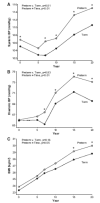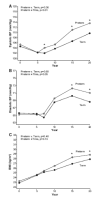Preterm birth and future maternal blood pressure, inflammation, and intimal-medial thickness: the CARDIA study
- PMID: 23319540
- PMCID: PMC3583341
- DOI: 10.1161/HYPERTENSIONAHA.111.00143
Preterm birth and future maternal blood pressure, inflammation, and intimal-medial thickness: the CARDIA study
Abstract
Preterm birth (PTB, <37 weeks) may be a marker of endothelial dysfunction and a proinflammatory phenotype; both are risk factors for cardiovascular disease. We studied 916 women (46% black) with 1181 live births between enrollment in the Coronary Artery Risk Development in Young Adults study (age 18-30 years) and 20 years later. C-reactive protein was measured at years 7, 15, and 20. Interleukin-6 and carotid intima-media thickness, which incorporated the common carotid arteries, bifurcations, and internal carotid arteries, were measured at year 20. Blood pressure, lipids, anthropometrics, and pregnancy events were assessed at all visits. Change in risk factors and differences in inflammatory markers and intima-media thickness according to PTB were evaluated. Women with PTBs (n=226) had higher mean systolic blood pressures before pregnancy (106 versus 105 mm Hg, respectively; P=0.03). Systolic and diastolic blood pressure increased more rapidly over 20 years compared with women with term births (P<0.01 time interaction), even after removing women with self-reported hypertension in pregnancy. Women with PTB versus term births had similar mean intima-media thickness adjusted for age, body mass index, race, lifestyle, and cardiovascular risk factors. C-reactive protein and interleukin-6 did not differ according to PTB. Women with PTB, regardless of hypertension during pregnancy, had higher blood pressure after pregnancy compared with women with term births. In the United States, where rates of PTB are high and race disparities persist, PTB may identify women with higher blood pressure in the years after pregnancy.
Figures


Similar articles
-
Prior preterm birth and maternal subclinical cardiovascular disease 4 to 12 years after pregnancy.J Womens Health (Larchmt). 2013 Oct;22(10):835-43. doi: 10.1089/jwh.2013.4248. Epub 2013 Sep 14. J Womens Health (Larchmt). 2013. PMID: 24033091 Free PMC article.
-
Preterm birth with placental evidence of malperfusion is associated with cardiovascular risk factors after pregnancy: a prospective cohort study.BJOG. 2018 Jul;125(8):1009-1017. doi: 10.1111/1471-0528.15040. Epub 2017 Dec 28. BJOG. 2018. PMID: 29193660 Free PMC article.
-
Preterm birth and long-term maternal cardiovascular health.Ann Epidemiol. 2015 Jan;25(1):40-5. doi: 10.1016/j.annepidem.2014.10.012. Epub 2014 Oct 18. Ann Epidemiol. 2015. PMID: 25459086 Free PMC article.
-
Women with Preterm Birth Have Evidence of Subclinical Atherosclerosis a Decade After Delivery.J Womens Health (Larchmt). 2019 May;28(5):621-627. doi: 10.1089/jwh.2018.7148. Epub 2018 Nov 2. J Womens Health (Larchmt). 2019. PMID: 30388049 Free PMC article.
-
History of Adverse Pregnancy Outcomes, Blood Pressure, and Subclinical Vascular Measures in Late Midlife: SWAN (Study of Women's Health Across the Nation).J Am Heart Assoc. 2017 Dec 29;7(1):e007138. doi: 10.1161/JAHA.117.007138. J Am Heart Assoc. 2017. PMID: 29288157 Free PMC article.
Cited by
-
Patterns of Cardiovascular Risk Factors in the Years Before Pregnancy in Nulliparous Women With and Without Preterm Birth and Small-for-Gestational-Age Delivery.J Am Heart Assoc. 2021 Jun 15;10(12):e021321. doi: 10.1161/JAHA.121.021321. Epub 2021 Jun 2. J Am Heart Assoc. 2021. PMID: 34075781 Free PMC article.
-
An observational claims data analysis on the risk of maternal chronic kidney disease after preterm delivery and preeclampsia.Sci Rep. 2021 Jun 15;11(1):12596. doi: 10.1038/s41598-021-92078-2. Sci Rep. 2021. PMID: 34131246 Free PMC article.
-
Variation in the Content of Postpartum Visits by Maternal Race/Ethnicity, Preconception, and Pregnancy-Related Cardiovascular Disease Risk, PRAMS, 2016-2017.Public Health Rep. 2022 May-Jun;137(3):516-524. doi: 10.1177/00333549211005814. Epub 2021 Apr 19. Public Health Rep. 2022. PMID: 33874796 Free PMC article.
-
Life-Course Reproductive History and Cardiovascular Risk Profile in Late Mid-Life: The CARDIA Study.J Am Heart Assoc. 2020 May 18;9(10):e014859. doi: 10.1161/JAHA.119.014859. Epub 2020 May 5. J Am Heart Assoc. 2020. PMID: 32366209 Free PMC article.
-
Association of Adverse Pregnancy Outcomes With Hypertension 2 to 7 Years Postpartum.J Am Heart Assoc. 2019 Oct;8(19):e013092. doi: 10.1161/JAHA.119.013092. Epub 2019 Sep 30. J Am Heart Assoc. 2019. PMID: 31564189 Free PMC article.
References
-
- Davey Smith G, Whit ley E, Gissler M, Hemminki E. Birth dimensions of offspring, premature birth, and the mortality of mothers. Lancet. 2000;356:2066–2067. - PubMed
-
- Bonamy A-KE, Parikh NI, Cnattingius S, Ludvigsson JF, Ingelsson E. Birth Characteristics and Subsequent Risks of Maternal Cardiovascular Disease / Clinical Perspective. Circulation. 2011;124:2839–2846. - PubMed
Publication types
MeSH terms
Substances
Grants and funding
LinkOut - more resources
Full Text Sources
Other Literature Sources
Research Materials

